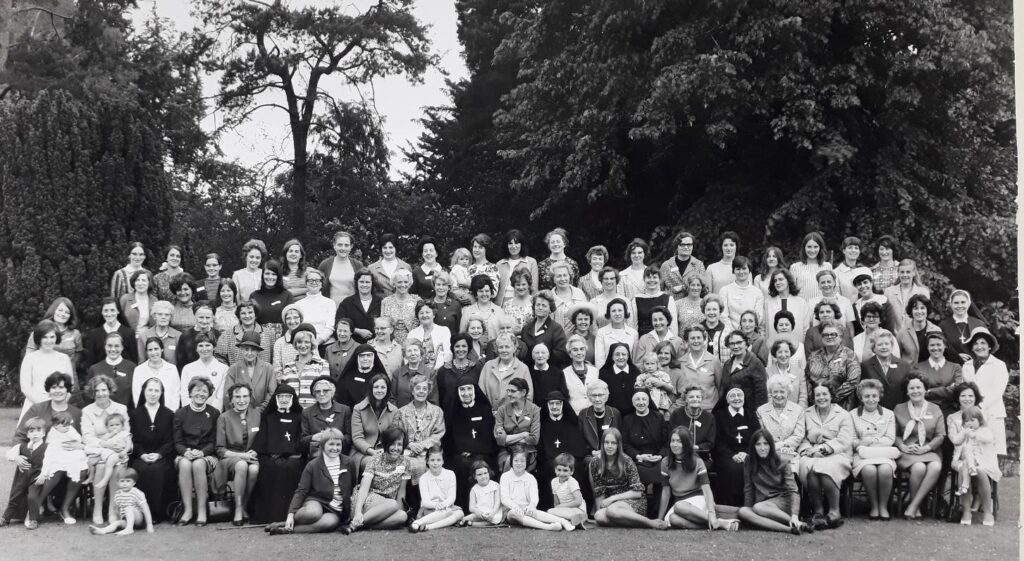Continued from PART 2: https://www.shcj.org/european/part-2-the-shcjs-121-years-in-oxford/
There is a gap in the records relating to the obtaining 14 and 16 Norham Gardens, but we know from the invitation to the Farewell Gaudy (Party) of 21st June 1969 that this was to be the Oxford Community’s new home by that date. The invitation communicates that ‘old students will always be welcome there’. 120 women, including 12 SHCJ sisters, attended the Gaudy to represent the 702 students who attended Cherwell Edge since St Frideswide’s hostel for students opened its doors to them. There were representatives from every generation of students.

The celebrations included a midday Mass, followed by a luncheon and after that ‘just talk, talk and talk’. Letters of thanks sent later expressed gratitude and the emotions felt that day, as summed up by the SHCJ account of it ‘a wonderfully happy one despite the sadness of the occasion’. The day had ‘united in a common bond of friendship the Edgers of all generations’ and the SHCJ hoped that ‘they went out with renewed courage and hope, and that the spirit of Cherwell Edge will live on, even though the place must change hands’.
During this time of transition, in August 1966, after many years as headmistress there, Mother M. Teresa was forced to resign from her position as headmistress of St Aloysius school which had been managed by SHCJ sisters for 64 years. The Provincial, Mother Mary Declan had to warn Fr J. Smalley S.J. that the SHCJ was now unlikely to have a suitable candidate for the role but would be ‘happy to work under the person who is appointed.’ She reflected that it was perhaps ‘a good thing’ for a lay person to take over given the emphasis placed on the role of lay people in the Church at the time. She believed that the presence of an SHCJ on the school staff would maintain the Society’s bond with the school.

At St Joseph’s school, a lay head had already been appointed after Sister M. Honoria’s retirement in 1953. However, his resignation after two months and a further headmaster moving to a role in the Secondary department in 1958 meant that Sr Lydia Gabler, who had been Sr M. Honoria’s assistant, took on the headship of St Joseph’s Primary department. She worked there with ‘four or five yoke- companions as SHCJ assistants’ – these being Sr M. McEntree, Sr M. Constance, Sr Jane Bennet and Sr Oonagh Barry – until 1977 when she reached retirement age.
In November 1969, Sister Mary Matthew wrote to her Provincial sending the architect’s plans for number 16 and details the slow but sure progress in number 14 as upstairs rooms were plastered and the wash basins were installed. She warns that the basement ‘still looks a shambles’ but states she will insist that such areas are completed in January to ensure that the community could move in February 1970. She worried about ‘the Province’s reaction to our carrying on with the University work here’ but hoped ‘it will be for God’s greater Glory in the long run’ with an ‘indirect apostolate, i.e. training others for the apostolate’ realised.

The Oxford house diaries record the removal of the first half of the Cherwell Edge SHCJ household to Norham Gardens on 23rd February 1970. The upheaval must have been eased by the ‘many kind welcoming letters, messages and gifts’ received from friends and well-wishers. Nine more SHCJ came to Norham Gardens the following day, the rest were to stay at Cherwell Edge until 18th March when they would leave to join the SHCJ’s other Oxford property at the time in Park Town. Masses were alternated between the two houses until March, with the first two masses being celebrated at Norham Gardens on 25th and 26th February when the Blessed Sacrament had been reserved. Plans for the adaptation of 14 to 16 Norham Gardens continued into the summer of 1970, with Sister Mary Michael keeping Reverend Mother Provincial informed of progress. On 2nd February 1971, a formal letter of support was received from Bishop Anthony Emery, representing the Archbishop of Birmingham’s Office, for the establishment of a Pastoral Centre by the SHCJ.
Bishop Anthony stated that the Oxford based priests he had met with were ‘enthusiastic and readily agreed with me about the urgent need for such a Centre in Oxford’.
Following this, an SHCJ working party was held in Norham Gardens on 24th April 1971 to ‘discuss plans for the pastoral centre and formulate a policy’. By June 1971, with the Centre’s direction outlined in this way, Sister Mary Lalor wrote to local schools offering the centre as a venue for residential courses with a conference room to seat 50 and residential accommodation for 25. From this early period onwards, organisations of diverse religions and purposes benefitted from the hospitality made available.
These included groups from the charities Oxfam, NSPCC and Oxford Mind, Catholic organisations such as the Catholic Education Service as well as the Buddhist Aukana Trust, the Reform Synagogue Retreat, the London School of Counselling and the Oxford Theatre Group.
The Cherwell Centre has also long provided a gathering place for SHCJ meetings and celebrations of feasts and Jubilees. In 1997, the SHCJ Community of Hastings moved to Rose Hill in East Oxford and the neighbouring communities would often share celebrations together.
For over 50 years the Cherwell Centre has carried out its mission to be ‘a place of Christ centred hospitality where, in an atmosphere of freedom and peace, people are supported in their search for God’. The SHCJ sisters had long strived to provide such ‘freedom and peace’ not only to the students whose learning they nurtured but also the parish, primary and secondary school children they taught. This gift was also received from SHCJ sisters by individuals such as Mrs Freeman who simply wished to return to the faith she had grown up practicing in an Edwardian Oxford where wealthy employers still held an attitude of religious intolerance against their workers.
In a year where many European Province sisters face great changes ahead, may they feel as those celebrating at Cherwell Edge for the last time did, despite the sadness of leaving, a ‘renewed courage and hope’ that the spirit of their community will live on.



Comments are closed.